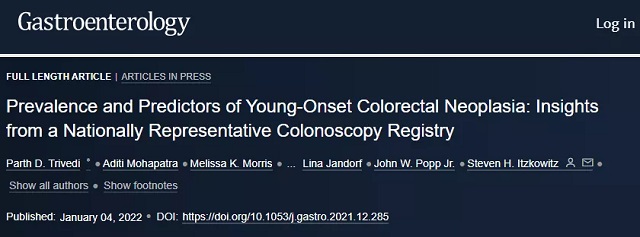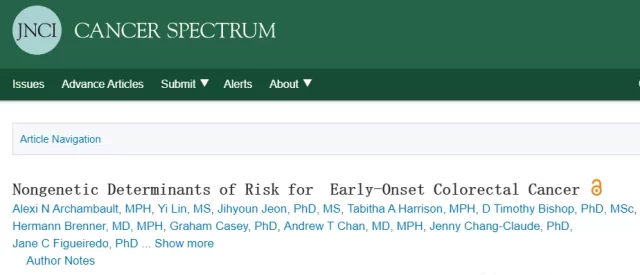Colorectal cancer screening should be advanced to 45 years old
- Why Botulinum Toxin Reigns as One of the Deadliest Poisons?
- FDA Approves Pfizer’s One-Time Gene Therapy for Hemophilia B: $3.5 Million per Dose
- Aspirin: Study Finds Greater Benefits for These Colorectal Cancer Patients
- Cancer Can Occur Without Genetic Mutations?
- Statins Lower Blood Lipids: How Long is a Course?
- Warning: Smartwatch Blood Sugar Measurement Deemed Dangerous
Colorectal cancer screening should be advanced to 45 years old
- Red Yeast Rice Scare Grips Japan: Over 114 Hospitalized and 5 Deaths
- Long COVID Brain Fog: Blood-Brain Barrier Damage and Persistent Inflammation
- FDA has mandated a top-level black box warning for all marketed CAR-T therapies
- Can people with high blood pressure eat peanuts?
- What is the difference between dopamine and dobutamine?
- How long can the patient live after heart stent surgery?
Colorectal cancer screening should be advanced to 45 years old.
Data analysis of nearly 3 million colonoscopy examinations: the starting age of colorectal cancer screening should be advanced to 45 years old.
Colorectal cancer (CRC) is a collective term for cancers that develop from tissues that originate in the colon or rectum.
According to the latest data released by the World Health Organization’s International Agency for Research on Cancer (IARC), colorectal cancer is the third most common cancer after breast cancer and lung cancer, accounting for 9.4% of patients.
Colorectal cancer has long been considered a disease of old age, meaning that the risk of developing it increases with age. However, about 10% of new cases are under the age of 50, known as early -onset colorectal cancer (EoCRC); and this proportion is increasing.
As a result, several countries have updated their guidelines to recommend lowering the starting age for colorectal cancer screening in general-risk groups from 50 to 45 years.
The clinical, pathological, and molecular features of early-onset colorectal cancer appear to be different from those of patients 50 years of age and older.
Many risk factors for late-onset colorectal cancer, such as a sedentary lifestyle, diabetes, dietary factors, obesity, and environmental exposures, are considered risk factors for early-onset colorectal cancer.
Last year, a large-scale study published in JNCI Cancer Spectrum (IF=13.506) , the top journal in the field of oncology, found that higher intake of red meat (pig, cattle, sheep, etc.), lower education levels and excessive alcohol consumption Factors such as these are associated with an increased incidence of colorectal cancer in people under the age of 50 .
However, the above factors do not explain all cases. Therefore, larger surveys of colorectal cancer incidence in people aged 45-49 years or in the years prior to the new recommended screening age are needed to identify additional risk factors.
In a new study published recently in Gastroenterology (IF=22.682), a top journal in the field of gastroenterology and hepatology, a research team led by the Icahn School of Medicine at Mount Sinai in New York, USA, analyzed nearly 3 million outpatient colonoscopies.
A large dataset of patients, identified the prevalence and risk factors of colorectal tumors in patients 18 to 54 years of age, and detailed pathological findings in those 45-49 years of age as well as those under 45 years of age.

During the study period from 2014 to 2020, a total of 2,921,816 colonoscopies were recorded, of which 562,559 were first visits.
145,988 cases occurred in people aged 18-44 years; 79,934 cases occurred in people aged 45-49 years; and 336,627 cases occurred in people aged 50-54 years.
The incidence of tumors and advanced precancerous lesions (APL) in all age groups is increasing year by year.
The researchers’ analysis found that age, male gender, whiteness, family history of CRC, bleeding or screening tests were all associated with higher rates of APL and colorectal cancer .
Among patients aged 45-49, the tumor incidence was 32%, and the incidence of APL and colorectal cancer was 7.5% and 0.58%, respectively; the incidence was almost equally high in the 40-44-year-old group.
Furthermore, Asians and American Indians/Alaska Natives had higher rates of APL, but African Americans and Hispanics had lower rates compared with whites.
This large nationally representative study of patients in the United States under the age of 50 showed that the incidence of colorectal tumors and advanced precancerous lesions (APL) in the 45-49 age group was almost as high as that in the 50-54 age group;
The incidence of rectal cancer is even higher. The incidence of APL is almost as high in the 40-44-year-old group as in the 45-49-year-old group, and the incidence of colorectal cancer is quite high.
It is also worth noting that even in the 30-39 year old population, 15-20% have pre-existing tumors, of which 2-4% have APL and 0.2-0.4% have colorectal tumors.
The researchers say the data support lowering the screening age to 45 for all average-risk groups and recommend that educa- tion of young people begin years before the earlier screening age.
Reference:
https://doi.org/10.1053/j.gastro.2021.12.285
Colorectal cancer screening should be advanced to 45 years old
(source:internet, reference only)
Disclaimer of medicaltrend.org
Important Note: The information provided is for informational purposes only and should not be considered as medical advice.




